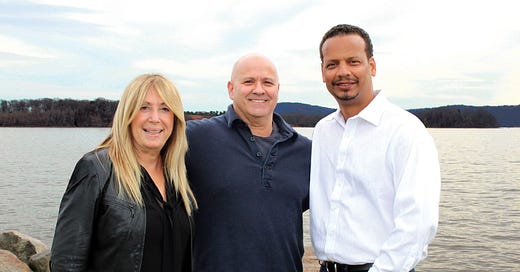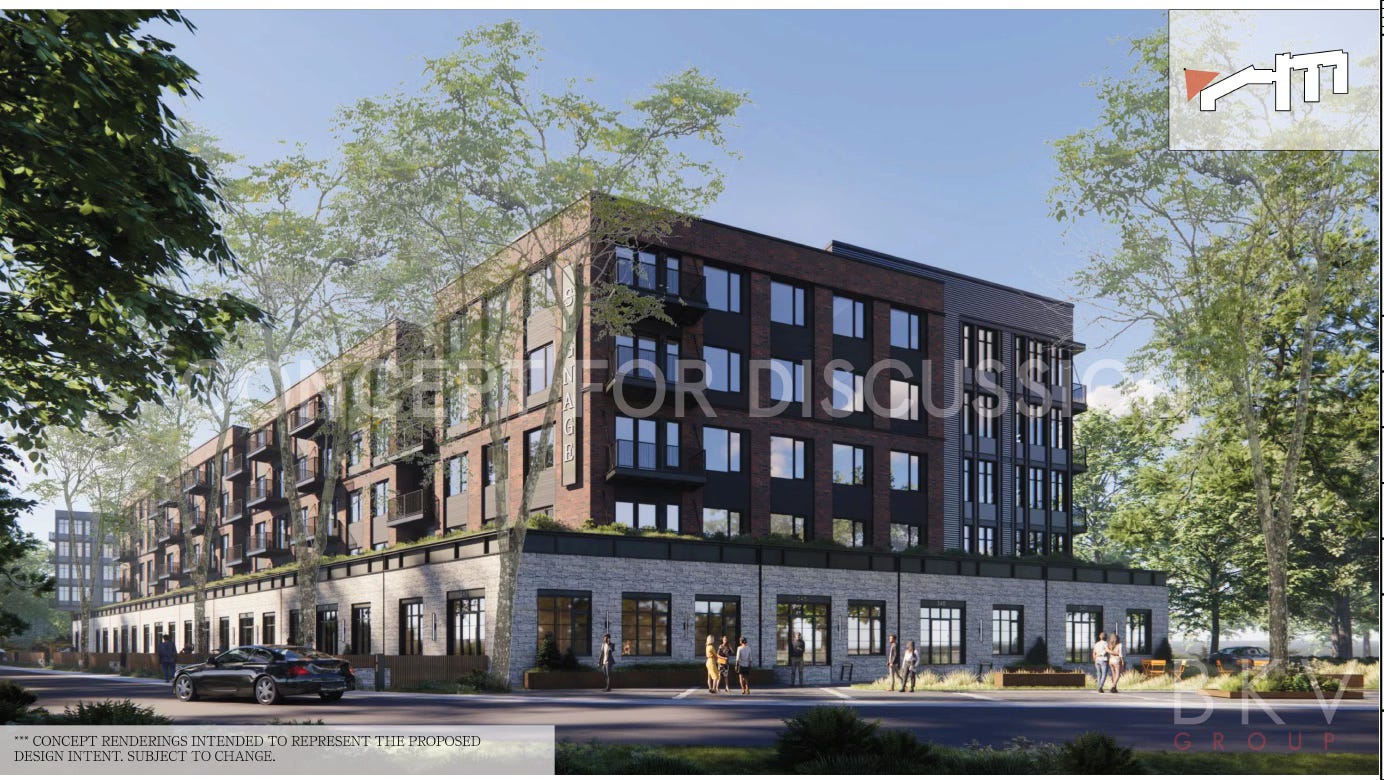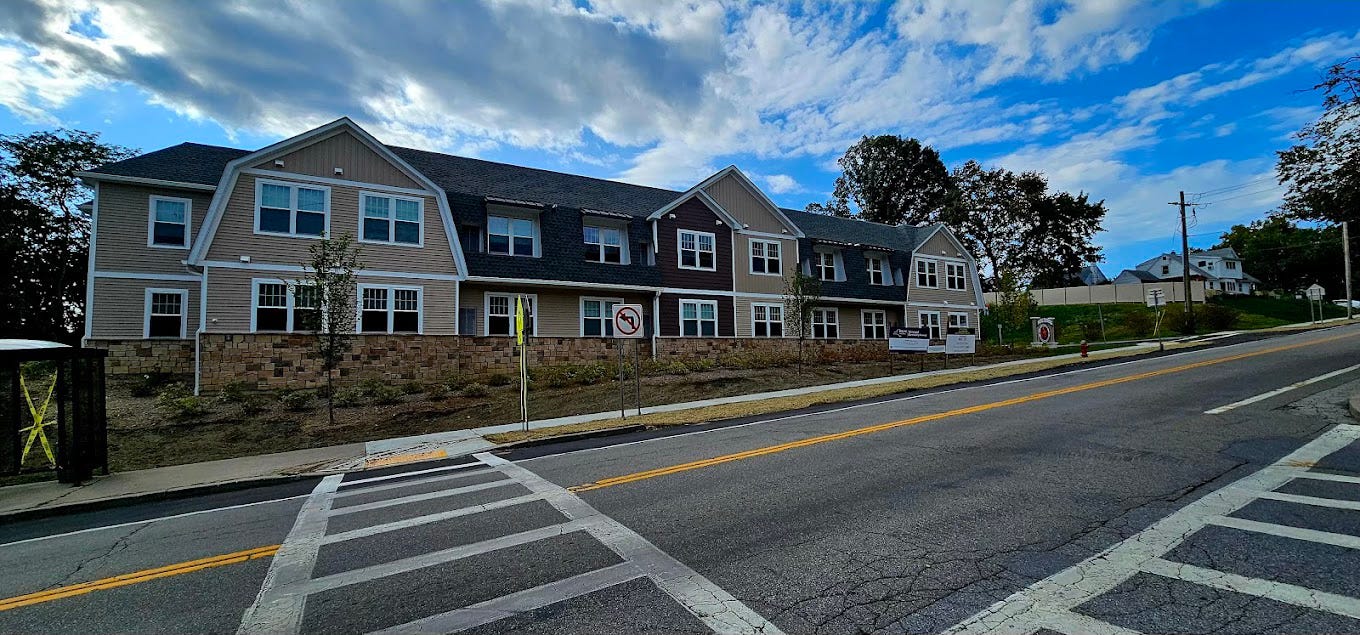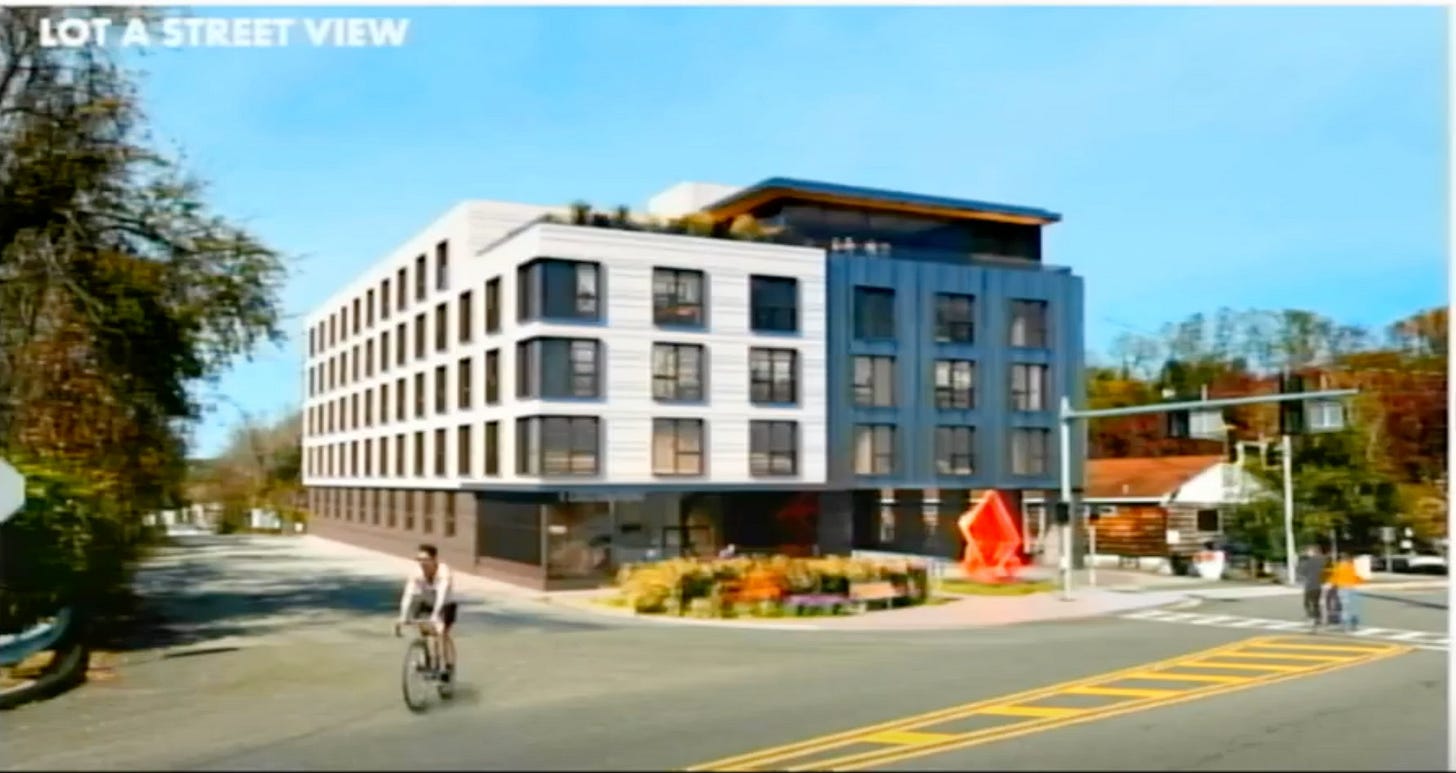Voice of Croton speaks! An in-depth discussion with Gary, Stacey, and Nigel.
Why they are running, their critique of the Pugh administration, the limits of housing development in Croton, village democracy and transparency, and other topics.
Left to right: Stacey Nachtaler, Gary Eisinger, and Nigel Ravelo.
Editor’s Note: The Chronicle strives to give equal space to all local candidates. Coming soon, an interview with Croton Democrat Nora Nicholson; interviews with Brian Pugh and Karen Pecora in the coming weeks.
CHRONICLE: First question: Why are you running? When you run for office, usually you’re not doing it for fun, you’re doing it because you think you can do a better job than the people you’re running against, or the incumbents. Or you’re not happy with the job they’re doing, or you think they have worn out their welcome. You ran a write-in campaign last year, now you’re coming back for the real deal on the ballot.
GARY: First, we want to thank you for giving us the opportunity to connect with Croton, and share why we are the right choice this November. We’re on the ballot because so many here in the village wanted it to happen. Their concerns, their questions were being ignored by the current administration.
CHRONICLE: I understand that it wasn’t a last minute decision, but there was a certain amount of spontaneity to your decision to run last year, is that correct?
GARY: Yes, 100%. In July of last year, if you asked me if I was going to run, I would have just looked at you like you had two heads.
NIGEL: Gary and I met at the board meetings. We had mutual friends and talked a few times. We shared similar views, so we continued talking and attending the meetings. However, as we spent more time together, we began to notice different things that started to bother us.
GARY: And continuing to this day, the mayor and the village have not found consensus on such big important projects, and that gave us great concern.
CHRONICLE: Now Stacey, you’re the new kid in town. Can I ask you how long you thought about it before you decided to run, were you reluctant at first? How did you approach it?
STACEY: I would say a year ago, I got alarmed when I saw they were going to build 280 units, six stories at 1 Half Moon Bay Drive. One lane, very winding curved road, that has no room for parking, possible accidents, lots of issues. So I got involved then in asking questions about it. I wanted to learn more about it, what’s behind it, the approach here, what are the implications of doing this. And I also voiced my concerns. And in doing that I met Gary and Nigel, I met other people as well that had similar concerns. It was through that process that I was pretty unhappy with the current administration, and I felt that our concerns were not being heard. When you were in town halls, I didn’t feel welcomed, and I think we were approaching this as citizens coming in, we wanted to learn more about it, and we felt shut down.
I have a professional executive background, I’ve worked with hundred million dollar budgets, and $20 million multi-brand product launches that are nationwide, that are incredibly complex, through WalMart, through Kroger, and dealt with some of the most challenging and difficult business environments possible. And I thought, okay, I think I have the skill sets to step up here, and do a better job. I see a lot of opportunities to leverage my leadership experience to support Village fiscal, economic, programmatic, and environmental improvements.
CHRONICLE: Gary, if you became mayor, you would become the executive, the CEO of the village, basically.
GARY: Yes. And I am skilled in administration and in building consensus. I have an MBA in finance as well.
CHRONICLE: So you would really have to run things. Brian Pugh has been playing that role now for eight years, since 2017, obviously he has his constituency. Let me ask, you mentioned briefly the critique of the Pugh administration and its inability to create a consensus, to bring people together. If I asked what is your basic analysis of what has gone wrong here, what would you say? Some people are convinced that Brian Pugh wants to have all this mushrooming of housing, Half Moon Bay, Lot A and so forth, because of his personal political ambitions. Maybe that’s true, maybe it’s not. What has basically gone wrong here, in your view?
GARY: For starters, they’ve gone four terms without any opposition. We feel like they’ve been in an echo chamber, they talk about an idea, and everybody loves that idea, and they’re not seeking pushback which many residents of the community might give them. And then projects happen beneath the surface, for months and years, and then they only come out when they’re fully baked, to present them, without having had community input on the development process.
CHRONICLE: So perhaps not a done deal, but so far along they’re hard to stop?
GARY: Yes. In fact, when we first announced we were running last year, I was told by many people, Half Moon Bay is a done deal, there’s no way to stop it at this point. In fact, you had really broken the news the February before, that these negotiations were happening, and that piqued our interest, but still we didn’t really hear much, we just knew that there was this project. Until April, when they started to roll it out, and they tried to do PR. They had two events, one at Capriccio’s, the opposition was just mind-boggling, and still they kept marching forward with this project. It got even more mind-boggling to me that the administration could hear such opposition and still be marching forward with this project.
My memories of the [Greg] Schmidt and [Leo] Wiegman administrations, I had been to a few meetings over the years, and I had spoken at a few of the meetings, I’ve been here 20 years, so maybe 15 or 17 years ago I spoke, and I really felt they listened to opposition voices. Where there’s absolutely no listening to opposition voices coming from this administration.
NIGEL: They listen to their “constituents.” As I began attending these meetings and witnessing individuals approaching to express their concerns—many of whom appeared visibly frustrated—some of their statements might have sounded like rants or something similar. However, they were justified in their anger. It’s challenging to speak clearly and concisely when you’re that upset. Therefore, for some of them to approach their leaders with such intense anger and express their feelings, and for the leadershipto not take that into account, to even just say, hold on, relax, let’s talk after this. There just isn’t anything. Then the next meeting comes along, and there’s no response. why aren’t they addressing opposing voices?
Everything is just being steamrolled. That was a very large driving factor for me, to step in there and voice the people’s concerns.
STACEY: I just want to add I’ve voted Democrat my whole life, and recently made the official change from Independent to Democrat after the 2024 election. However, prior to registering as a Democrat after the 2024 election, I tirelessly canvassed for and registered new Democrats, and have proof of such activity. But I don’t feel like this village is run like a true democracy. So that concerns me. And then I’m very proud of partnering and working with Gary and Nigel, I’ve learned a lot from them. I think in a way we are all kind of data geeks, I’m very consumer-centric focused, I have a career in innovation and transformation. And it’s been successful because it’s very consumer led. Gary’s great with numbers and people and Nigel with data. Why we think we would do a better job is because we’ve been digging into the data, and it’s clear that under this current administration residents have continued to face growing tax liabilities, growing village service fee hikes, and high debt service ratio to revenue. In the short and long term.
Particularly long term, because of the developments that are going on and we’re not getting enough fees or the proper amount of taxes to cover Village liabilities. So we’ve been digging into the numbers, it hasn’t been easy to find, hasn’t been easy to get, but we’ve been doing our homework.
CHRONICLE: When you say it hasn’t been easy, is there resistance to providing you with the information from inside the village? What causes that difficulty?
NIGEL: We haven’t conducted any FOIL requests [New York Freedom of Information Act]. Instead, we’re skimming the surface of what’s available online on the village’s Website. We’re also reviewing older postings from meetings and other relevant documents that have been uploaded online. By following this trail, we’re trying to connect the dots and gain a comprehensive understanding of the village’s activities.
CHRONICLE: There’s a fair bit there, right?
NIGEL: There is, we are a group of three, and not a machine, right?.
STACEY: We’re not a party, we’re a community group.
NIGEL: I have a job, Gary has a family to take care of, he’s retired but he has a lot on his plate…
CHRONICLE: No national organization behind you?
NIGEL: We’re not there yet! A lot of people are rooting for us but we could use some more volunteers. We’re very grassroots, and we’re trying to challenge the establishment on a shoestring budget.
STACEY: It’s interesting because when you talk to residents, some of them just take on the surface what they read and think, financially we’re good. But when you dig into things… Did you know that since the mayor took office the average Croton property taxes have increased 15%. And in addition the current administration’s elimination of the assessor, to Cortlandt, raises annual village property taxes on 1200 homes. But the mayor got a 39% village property tax cut on his personal home.
CHRONICLE: Now he’s offered to donate it back, how seriously…
STACEY: That’s right…
GARY: I did some math last night. A $1750 tax increase on a property, several hundred people have increases of that magnitude, will result in a $25,000 decrease in that property’s value. Given an assumed interest rate of 5%, which is conservative, and a [mortgage] of 30 years. In the case of our mayor, who will receive a similarly sized tax decrease from this policy to save the village $33,000, his property alone is now worth $25,000 more when projecting the net present value of that tax decrease.
CHRONICLE: That’s really interesting. So if Mayor Pugh sold his house…
GARY: Tomorrow.
CHRONICLE: He would actually benefit. And nobody buying it would be bound by the promise to give the money back?
NIGEL: Not at all.
GARY: I wish I had done that at the meeting. To show that to save $33,000… And he’s got 1200 families, 300 or 400 of which have sizable increases. That’s a major decrease in their property values.
STACEY: And then we analyzed, there are 300 service fees in our village. Approximately. Permits…
GARY: Of which ten years ago there were only a hundred and something. So he’s added fees to a lot of…
STACEY: He added 131 more village fees.
CHRONICLE: Could you give a few examples of the kinds of fees you are talking about?
STACEY: I’ll give you an example: Village Day Camp fees; Various Village Day Camp fees for Village residents have spiked between 28% and 41%, outpacing the rate increases for non-Village residents that are between 24% and 36% across the same registration range.
NIGEL: Other fees include Kayak rentals, Silver Lake…
STACEY: Canoe permits.
CHRONICLE: You don’t really think about all these things.
STACEY: No you don’t.
GARY: The tax rate is not going up this year, but the water rate has gone up by something like 30% in the last eight years. So there have been other fees that we pay that have spiked substantially.
STACEY: We are advocating a moratorium on fee increases for village residents.
CHRONICLE: For an indefinite period of time? Or a certain period of time?
STACEY: That’s a good question and we’re looking into that.
GARY: The last month our focus has been getting on the ballot.
CHRONICLE: Can you tell me how many signatures you ended up with?
GARY: 350, something like that. 300 plus.
CHRONICLE: And what was the minimum that you needed?
STACEY: 100.
CHRONICLE: So you tripled that.
STACEY: Right. We only had a few weeks to do it.
GARY: You have to do it within a window of time.
STACEY: If we had started six months ago we would have gotten thousands!
GARY: They have to be registered voters in the village.
NIGEL: And they have to have voted in the last election.
CHRONICLE: Let’s go on to a question for Gary and Nigel. What were a couple of the main things you learned from last year’s write-in election? That you think are going to help you now? Nobody denies that 1400 votes each in a write-in election is really impressive. That was probably a little bit of a shock to your opposition.
GARY: Not sure this fully answers your question, but we learned that there’s a lot of residents out there who want a change from those marching to the drumbeat of state policies, and towards a slate that favors hyperlocal community needs, with no strings attached.
NIGEL: We also learned that a lot of village residents feel the same way that we do. Many of them feel that the current administration has just been there far too long. As Stacey said, it just doesn’t feel like a democracy. Our grassroots campaign, our principle initiatives, everything’s going to be guided and shaped by Croton residents. And that’s what we’ve been voicing since Day One. We will be all over the community and listen to the people. We did this the first time around and every event we went to, whether public or private, we were well received. We heard their message and their concerns. There is no machine, no firewall on us, and there is no charade.
CHRONICLE: The timing of the pause on the development of 1 Half Moon Bay Drive–-I’m calling it a pause because many think it’s going to come back in some form—a lot of people have the impression that the timing of it was a political move. They may have realized that with you banging on the door they had to do something. The question is, do you think they are afraid of you, do you think that they are taking you seriously now?
NIGEL: I think the last time around, after a couple of weeks, and lots of applause for Gary’s awesome speeches, they started taking us very seriously, especially after how well we organized in such a short period of time. I’m still in shock at how good it was. I’m sure they knew we were on the ballot, even prior to the announcement. I definitely think they are taking us seriously and I’m sure we will start to see more polished, user-friendly projects, to divert the attention of the public eye.
GARY: They have to take us for real, we got 38% of the vote as write-ins, that doesn’t happen very often.
STACEY: In a critical election.
CHRONICLE: We wrote in the Chronicle, it was historic in Croton. Let’s go on to housing, which is a real burning issue. Obviously Voice of Croton would not have run in the first place if it were not for that long-running battle. This 8.4% rent increase at Maple Commons, a lot of people are talking about that. What does that tell you, what kind of comment would you make? How do you react to that?
GARY: It’s a little shocking. After so much was given to the developers, and so much is continuing to be given to the developers, with a PILOT (Payment in Lieu of Taxes) that’s clearly below what we would receive if it was 80/20 market rate/affordable. To have gotten all this and now people have been there less than a year and there’s going to be an 8 percent increase, it’s not 1 or 2 percent. I’m already hearing a lot of people saying the developers have really short-changed the town. None of us came out and spoke against that development. Now that we’ve looked and we’ve seen some of the other four submissions to the original RFP [Request for Proposals], we certainly question the quality of this selection. And then to have an 8 percent rent increase on our backs feels inappropriate.
NIGEL: With the residents there, and it’s not just Maple Commons, you are hearing it everywhere, it fluctuates depending on where it is. It’s completely not fair to build this structure 100% low income, and inform low income applicants that hey we’ve got this nice new shiny place in Croton-on-Hudson, you’re good to go. And then they move from wherever, some of them came from a long way away. They moved here, looking for a better life, a better future, rent stabilization and affordability. But shortly after they move in, they are told oh by the way we’re going to raise the rent. What was their situation prior, and how do you compare what their expenses were prior to this, versus now with this 8 percent increase.
CHRONICLE: Yes I’ve been talking to the residents. The residents are starting to speak out about what they feel they were promised.
STACEY: Just to build on that, my first reaction was empathy for the residents. I know they qualified based on different tiers of income, but an 8.4 percent increase off whatever their base is, if you’re living paycheck to paycheck, that’s really difficult. With the rate of inflation today, so my first reaction was empathy for them, and then my second thought was, this 8.4 percent is going directly to the developer, the village is getting nothing. So these residents who come in under the pretense of affordability, and now it’s getting less affordable, they have less money in their pockets but the developer has more money in their pocket. None of that is trickling down to our village.
GARY: They got $3 million from the state, to the developer.
STACEY: The developer got $3 million from the state for Maple Commons.
CHRONICLE: The combination of state and county money?
GARY: Yes.
CHRONICLE: So a couple of questions here. Let’s go back to the question of transparency. Gary, you raised this earlier. We don’t find out until later. With the RFPs, we were not allowed to find out what the competing bids were for Maple Commons until after it was a done deal, and we were not allowed to find out what the competing bid was for Lot A until after they had signed the promise to buy. If we have a new project, and there are competing RFPs, will you, if you are in office, let us see what those proposals are, so the villagers can have some input?
NIGEL: Absolutely.
CHRONICLE: Would you pledge to that?
NIGEL: Absolutely.
STACEY: One hundred percent.
CHRONICLE: The Pugh administration used the reason to keep the bids secret that it would affect the purchase price, if we knew what all the proposals were.
GARY: I don’t understand that. If you have a proposal, the proposal states those parameters. The parameters have been established, now it should be made public.
NIGEL: The bidders are not going to say, oh wait, the public now knows what we bid, let me take that back.
GARY: I don’t know if the RFP had a secrecy clause…
CHRONICLE: I don’t believe so. I have read them, I don’t recall anything like that.
NIGEL: I worked for 15 years in the telecom and data transmission industry for the private sector. We provided very high-speed data transmission services to numerous governmental, state, and public entities, including school districts and local governments. Every year, I responded to hundreds of bids. When it comes to public bids, there is no secrecy.
CHRONICLE: One more thing on housing. Gary and Nigel, you raised this last year, and it’s been raised at board meetings. What is the responsibility of a community like Croton, with 8000 people, to the housing crisis? Have we done enough, should we do a little bit more? If the Finkelstein family and Monday Properties and their partnership comes back and proposes 200 units instead of 300 units, 280 or whatever, are you going to be interested? What would be realistic and reasonable if you were in office? How do we make these decisions moving forward?
NIGEL: We believe that Croton should remain a village in terms of size and scope. We are advocating for those who have generations of roots here, those who have worked tirelessly and sacrificed much to make it here. I am one of them. I come from immigrant parents, and many of us do. Growing up in Manhattan, I lived there for 28 years. As a single father with my little daughter, I moved to Croton. I realized that I couldn’t raise my daughter in the fast-paced environment of New York City. I needed a village to raise my daughter. When we arrived in Croton, we were embraced by the village not only by its charm but also by its people. The people here are amazing and have helped us in countless ways. They have helped us progress and achieve our dreams. While I was here, I worked hard and received tremendous support to get to where we are now. My daughter is off to college, and I am starting my own business, so I am no longer in corporate America. In essence, I am living the American Dream.
To continue answering your question, we believe the housing stock should be mixed, and if there’s more to be done at this point, given all the recent development, that skews toward condos and townhomes in the middle, which establish or foster real economic pathways to homeownership. Apartments, condos and townhome neighborhoods that fit a Village — and include community spaces and avenues for local entrepreneurs — all have a place here.
CHRONICLE: So basically you’re going to drive a harder bargain for anybody who comes in and proposes to build some affordable housing? Is that correct?
GARY: I think the first is we have to follow the comprehensive plan, which states 80/20 [market rate to affordable.] I’m all for 80/20, I think it’s the only way to effectively address the housing shortage. It’s financially more feasible, and efficient. With market rate contributing to both development costs and improved tax revenue. It leads to positive spillovers in high opportunity areas, it benefits both affordable and market rate residents, it helps integrate low income residents into higher income communities, and it potentially offers more opportunities for upward mobility, while I feel 100% affordable housing leads to segregation and isolation for low income residents.
NIGEL: To Gary’s point, one of the concerns raised by our constituents during the board meetings was precisely this. They weren’t just upset about the construction of new buildings; many of them were also concerned about the stigma associated with being 100% affordable housing. They voiced that if the housing was mixed, it would be difficult to distinguish between residents. 100% affordable doesn’t benefit current or future Croton residents in terms of housing affordability. An issue we feel will be related to property tax increases. We pointed out earlier that 1200 residents will have their property taxes raised, while many more will have theirs lowered, and their property values will increase. So, where is the balance? Do we have more properties that will experience price increases due to these taxes, or do we have more properties that will experience price decreases?
The general focus of the current administration is on making fiscally poor development deals that will squeeze in high-density buildings in a way that leads to urbanization.
STACEY: The numbers, too, philosophically, mixed use, we want to stand by the comprehensive plan. When we dig into the numbers of Lot A, for example, there was a memo, from KSCJ consulting, dated October 16, 2024, they compared tax revenues and costs of Lot A being 100% affordable versus market rate. So when we looked into that, we learned that village school district and library revenues would be at least $250,000 per year less under 100% affordable Lot A, versus it being an 80/20 mix. If you extrapolate that over thirty years, that’s $7.5 million, including roughly $2.6 million in lost village revenues alone. So we are adding population density but we’re not bringing in enough revenues to really manage all these expenses in the long term.
GARY: And the jump with Lot A to the AHOP [Affordable Housing Opportunity Program] really was against the comprehensive plan, which is supporting 80/20 development. How did we make that jump? Not only are we losing the tax revenue going forward, but there’s no parkland reservation they can make, as they did with the pocket park at Maple Commons. There’s a fee in lieu of parkland, but because they jumped to 100% affordable, they waived that fee. Whereas if it’s 80/20 they would pay the fee to our village on the 80 but not the 20.
CHRONICLE: You may not think this is a fair characterization, but last year some people felt you were running kind of a one issue campaign because the housing issue had become so explosive. It was the main thing on everybody’s mind. I assume that this year, you’re running for three seats on the board, you’ve got other issues you are interested in. And if you were elected you would not just be dealing with housing, but with all kinds of other things, from telecom to leaf blowers and so on. What would be some of the issues or initiatives forward looking that Voice of Croton would want to take on?
GARY: We have two big policy issues that we want to bring. They both involve referendums. One is to have a referendum on the sale of village property. That we don’t sell village property unless there is a majority of residents that think it’s the proper course of action.
CHRONICLE: That’s a biggie.
GARY: Yes. And the second is, this is going to be a tough call, moving the election back to March.
CHRONICLE: So you want to do that.
GARY: As part of our hyperlocal campaign, village politics stay village politics and don’t get oversaturated with national politics across the slate. In a local March election, residents vote on issues that impact Croton-on-Hudson and not national issues.
CHRONICLE: It takes a referendum to do that, right?
GARY: Yes.
CHRONICLE: That was Brian Pugh and Kevin Davis, back in 2011 I think it was, who initiated the shift to November voting?
GARY: Spot on.
CHRONICLE: Let’s drill down a little bit on referendums for village sales. This was a surprise to me, I talked to the Village Manager about it, that they don’t even have to have a public hearing to sell village land. Why is it like that?
STACEY: I agree.
NIGEL: How did we get to this point? One thing we have discovered is that other villages and towns do vote on the sale of public land. We asked ourselves why can’t we do it like that?
CHRONICLE: Is it democratic for them to do this?
STACEY: I don’t think so. To add to it, reaching out to the constituents, and understanding what is needed most. I can’t tell you how many young families would love to have a youth center here. The teenagers are roaming the streets, which is fine, they would like to see a youth center. And that comes down to how we would approach the housing. If it’s mixed use, let’s negotiate with the developer to include a youth center, or some of the other creative, innovative things that Crotonites are seeking.
GARY: And this is part of the comprehensive plan, part of the RFP, to add a community project to Lot A, and the mayor unilaterally decided that it was not necessary…
CHRONICLE: Does that surprise you? I know you, Gary, have gone to a lot of Planning Board meetings, and this has come up a number of times now. The VP of WBP Development, John Bainlardi, has fudged about this quite a bit. Does it surprise you that the Planning Board has not been tougher on that question? This was in the RFP, they were supposed to do this. What about that?
NIGEL: That’s a very good question.
GARY: I mean, 10 units less, or 15 units less, would result in less profit for the developer. I don’t think the current administration negotiated very strongly. And they’re still not. The developer shared with me early on that if the fee in lieu of parkland was not waived, the village would reduce the sales price by that amount.
CHRONICLE: Let me ask you, the village is not particularly unified on a lot of issues, as you know one of the Chronicle’s hobby horses, although we get grief every time we publish about it, is the leaf blower law. This came up again at a board meeting. A resident spoke and said we needed to get tougher on enforcement and go to a year round ban, a couple of trustees were in favor, Cara Politi, for example. Last questions for tonight. Do you have a position as Voice of Croton, should we going for a year round ban, as originally envisioned by the Conservation Advisory Council, and given that there is division about it in the village, what in your view is the best way to deal with a situation like that, where people simply do not agree?
NIGEL: Yes, this is one of those things that divides our village, as you mentioned. It’s another example of having a conversation, bringing it to a central location, and seeking resident input to determine the best course of action. Our position is that we will expand on this and gather that input. I used a landscaping service for a while but had to stop because of the impact of the leafblower ban on my finances. I bring this up not to express my support or opposition to the leafblower ban but to contribute to the conversation. Was it addressed or considered; How will it affect residents who rely on landscaping services? How will our fees be impacted if these services have to defer for months due to the battery-powered machines? The batteries don’t last long, especially on some of the properties in our village. Mowing still requires a two-stroke engine. How can we address the noise issue? I work from home, and it can be annoying, but landscapers need to make a living. They will likely pass on the costs to us. I recently bought a fully battery-powered lawn mower, leaf blower, and weed whacker, and I’m thrilled with it! It’s better for the environment, and I genuinely want to reduce our carbon footprint. There are pros and cons, but it’s important to bring this to the table and discuss it with various people, including the landscapers.
CHRONICLE: Let’s have a wrap up. Is there anything I did not ask you that you wish I had? And what would you like to say to summarize our conversation?
NIGEL: I think all of your questions are going to provide a lot of information to the residents once this is published. I think we addressed the majority of things we are talking to people about.
GARY: One thing we are passionate about is the way public hearings are held in the village. We get 48 hours of notice, I think that when they have big issues coming up, they need to telegraph that to residents so they can plan ahead. I will find out on Monday afternoon that there’s a hearing on Wednesday afternoon, or some other topic that’s of interest to me. We have to find a way to give the public better notice so they can plan for these meetings. You see, you don’t really get a lot of turnout, that has to change, we need more turnout so that people can share their thoughts.
CHRONICLE: Okay. Thank you for taking the time to have this discussion with the Chronicle, and with the people of Croton. I am sure we will be talking more soon.
**********************************************************************************************************
To share this post, or to share The Croton Chronicle, please click on these links.
Comments policy: No personal attacks, please be polite and respectful at all times.









This interview reveals an in depth understanding of the village’s situation by the Voice of Croton candidates. Their responses are thoughtful and constructive. They must find a way to get this interview in the hands of voters. The majority of voters still don’t know them or understand the issues here. They need to be more visible and vocal starting now. Pugh has the advantage of incumbency and support of the Democratic machine. But the average villager, once they become aware of the threat of urbanization, will be on their side.
Thank you all for stepping up! And to the Chronicle for this in-depth post.